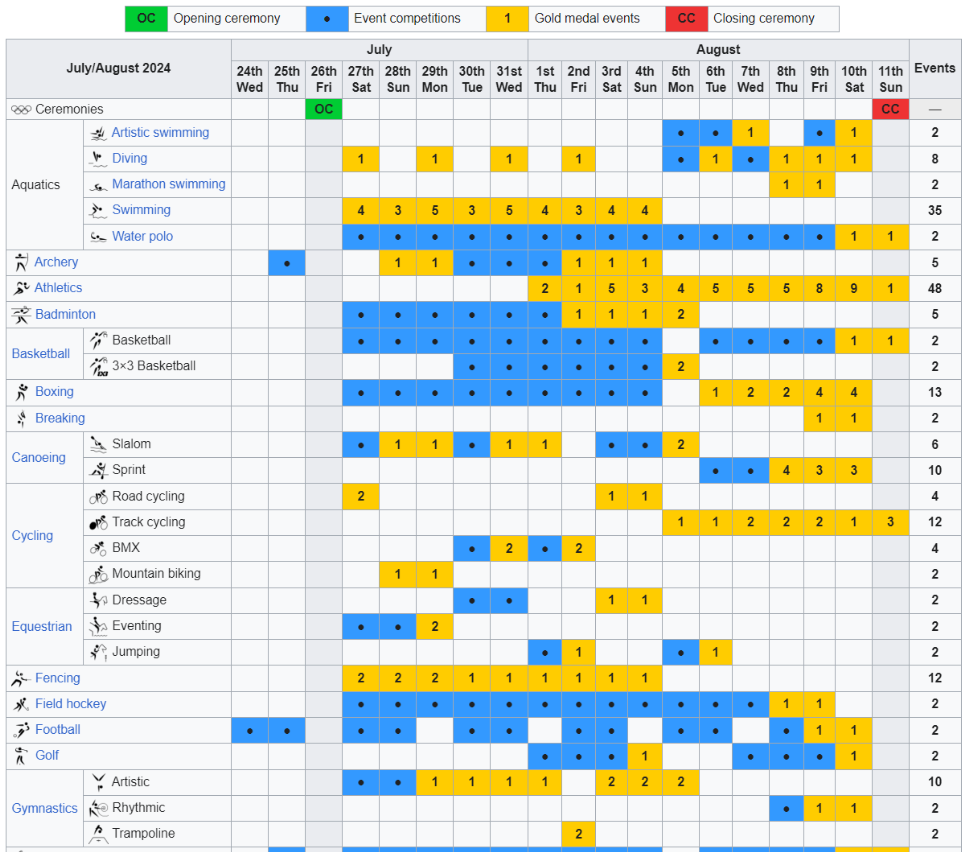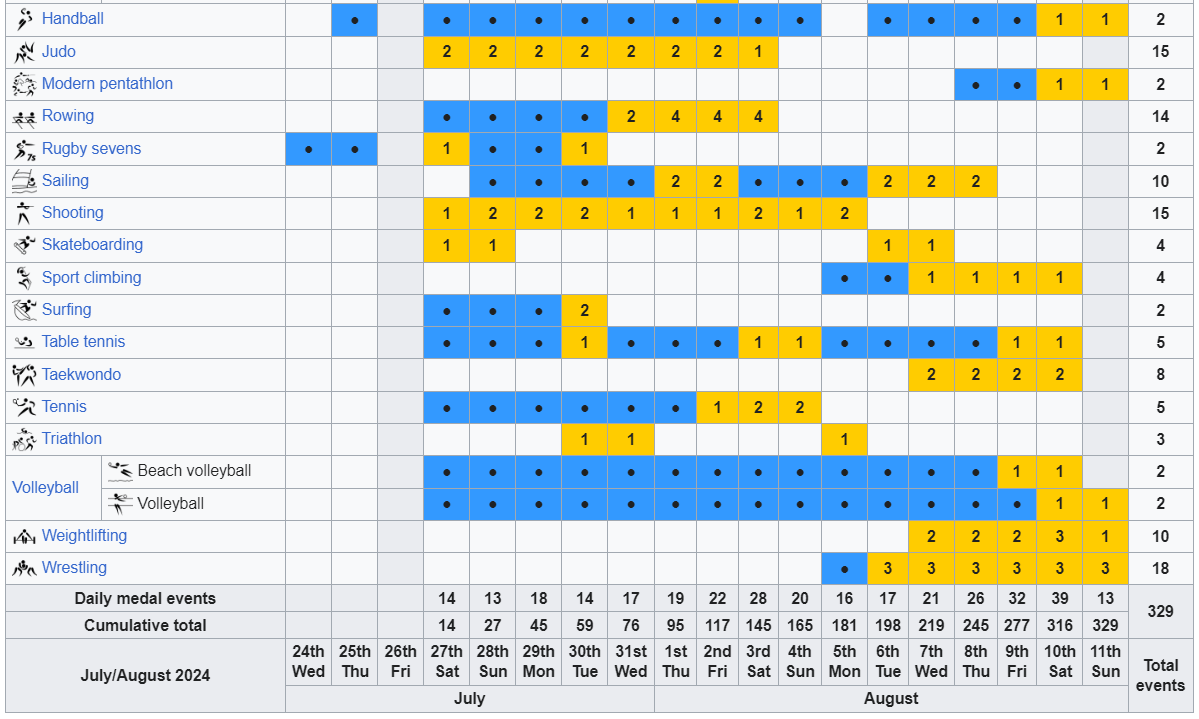Summer Olympics Schedule Breakdown

The Summer Olympics schedule is a complex and meticulously crafted document that dictates the flow of competition over a two-week period. It encompasses a vast array of sporting events, each with its own set of qualification rounds, preliminary heats, and finals. This intricate schedule is the result of careful planning and consideration of various factors, ensuring a balanced and engaging experience for athletes, spectators, and broadcasters.
Factors Influencing Schedule Creation
The creation of the Summer Olympics schedule is a multifaceted process influenced by a range of factors, including athlete availability, venue capacity, and television broadcasting requirements.
- Athlete Availability: The schedule must accommodate the diverse training schedules and peak performance periods of athletes from various sports. For instance, swimmers often peak in the summer, while track and field athletes may reach their optimal form later in the season. The schedule is designed to ensure that athletes are competing at their best during the Games.
- Venue Capacity: The schedule must consider the capacity of each competition venue. Some venues, like the Olympic Stadium for track and field, can accommodate large crowds, while others, like swimming pools, have more limited seating. The schedule is structured to optimize the use of venues and minimize potential conflicts.
- Television Broadcasting: Television broadcasting plays a crucial role in the global reach of the Olympics. The schedule is designed to cater to prime-time viewing audiences in major markets around the world. This involves scheduling high-profile events, such as the opening and closing ceremonies, and finals in popular sports, during peak viewing hours.
Challenges and Considerations
Creating a balanced and engaging schedule for the Summer Olympics presents numerous challenges.
- Balancing Athlete Participation: The schedule must balance the need to provide athletes with sufficient rest and recovery time while ensuring that they have the opportunity to compete in multiple events. For example, athletes competing in multi-discipline events, like the decathlon or heptathlon, need to be scheduled strategically to allow for adequate time between events.
- Maximizing Spectator Interest: The schedule must cater to the diverse interests of spectators, ensuring a variety of events are available throughout the day. This involves scheduling popular sports, such as basketball, swimming, and gymnastics, alongside less-known but equally exciting disciplines, such as archery, badminton, and fencing.
- Optimizing Broadcast Coverage: The schedule must accommodate the needs of broadcasters, who aim to provide comprehensive coverage of all events. This involves scheduling key events, such as finals and medal ceremonies, during peak viewing hours and ensuring that there are no major clashes between events that might appeal to the same audience.
Breaking News and Updates: Breaking At The Summer Olympics Schedule

The Summer Olympics is a dynamic event, and unexpected circumstances can arise, leading to adjustments in the schedule. Breaking news events, such as athlete injuries, weather disruptions, or changes in competition format, can significantly impact the flow of the Games. These events often require immediate action and strategic planning to minimize disruption and ensure a fair and enjoyable experience for all involved.
Impact of Breaking News Events on the Olympics Schedule
Breaking news events can significantly affect the Summer Olympics schedule, influencing athletes, spectators, and broadcasters.
- Athlete Injuries: A serious injury to a prominent athlete can disrupt the schedule, leading to postponements or cancellations of events. For example, in the 2016 Rio Olympics, a severe injury to a top gymnast forced the postponement of the women’s all-around competition, affecting the athletes’ preparation and the overall schedule flow.
- Weather Disruptions: Extreme weather conditions, such as heavy rain, strong winds, or extreme heat, can necessitate schedule changes. For instance, during the 2012 London Olympics, torrential rain caused delays and postponements in sailing and rowing events, impacting the athletes’ performance and the spectators’ experience.
- Changes in Competition Format: Sometimes, unforeseen circumstances lead to changes in competition formats, which can require adjustments to the schedule. In the 2020 Tokyo Olympics, the men’s marathon was moved from the traditional morning slot to the evening to avoid extreme heat, impacting the athletes’ performance and the broadcasters’ coverage.
Hypothetical Scenario and Schedule Adjustments
Imagine a scenario where a major earthquake strikes the host city during the Olympics. This event would require immediate action to ensure the safety of athletes, spectators, and staff.
- Evacuation and Safety Measures: The first priority would be to evacuate all athletes and spectators to safe locations, ensuring their well-being. This would necessitate the temporary suspension of all competitions and events.
- Schedule Adjustments: Once the immediate threat is mitigated, the organizers would need to assess the damage and determine the feasibility of continuing the Games. If the venues are deemed safe, the schedule could be adjusted to accommodate the disruption. This might involve postponing certain events, adjusting competition times, or even canceling specific events altogether.
- Communication and Transparency: Maintaining open and transparent communication with athletes, spectators, and the media would be crucial. Regular updates on the situation and any schedule changes would help manage expectations and maintain confidence in the Games.
Impact of the Schedule on Athletes and Performance

The Summer Olympics schedule, with its intense competition and packed schedule, presents both opportunities and challenges for athletes. While the opportunity to compete on the world’s biggest stage is a dream for many, the demanding schedule can significantly impact their performance and recovery.
Impact of Schedule on Different Sports
The impact of the schedule varies greatly across different sports. For endurance sports like marathon running and cycling, the schedule might be more forgiving, allowing athletes sufficient time for recovery between events. However, for sports requiring explosive power and agility, like sprinting or gymnastics, the tight schedule could pose a greater challenge, potentially leading to fatigue and injury.
- Swimming: Swimmers often compete in multiple events over a short period, requiring intense training and rapid recovery. The demanding schedule can increase the risk of burnout and overtraining.
- Gymnastics: Gymnasts need to maintain peak physical and mental condition for their routines, which require immense strength, flexibility, and precision. The schedule’s impact on their performance can be significant, potentially leading to fatigue, injuries, and mental exhaustion.
- Track and Field: Track and field athletes, especially those competing in multiple events, face a demanding schedule that requires careful planning and execution. The tight schedule can impact their ability to recover adequately and maintain peak performance levels.
Strategies to Optimize Performance, Breaking at the summer olympics schedule
Athletes can employ several strategies to optimize their performance within the constraints of the Olympic schedule.
- Strategic Training: Athletes and their coaches can tailor training programs to the specific demands of the Olympic schedule, focusing on maximizing recovery and minimizing fatigue. This might involve adjusting training volume and intensity, incorporating rest days, and implementing specific recovery techniques.
- Nutrition and Hydration: Maintaining proper nutrition and hydration is crucial for athletes to perform at their best. A balanced diet and adequate fluid intake can help athletes recover quickly and maintain energy levels throughout the competition.
- Mental Preparation: The mental aspect of competition is equally important. Athletes can utilize mental training techniques like visualization, mindfulness, and positive self-talk to stay focused, manage stress, and maintain confidence.
- Sleep Management: Adequate sleep is essential for physical and mental recovery. Athletes can prioritize sleep during the Olympics, creating a consistent sleep schedule and ensuring a conducive sleep environment.
Breaking at the summer olympics schedule – The Summer Olympics are a whirlwind of athletic feats and packed schedules, but sometimes you just need a break. Maybe a frosty treat from Wendy’s Frosty would hit the spot. Then, you can get back to cheering on your favorite athletes in the pool, on the track, or on the field!
Trying to catch all the action at the Summer Olympics can be a real challenge, especially when you’re trying to balance it with your other commitments. I mean, who can resist watching a nail-biting swimming final when you know actor Colin Farrell’s son is going to be in the next big Hollywood flick?
But hey, at least you can always catch the replays later, right?